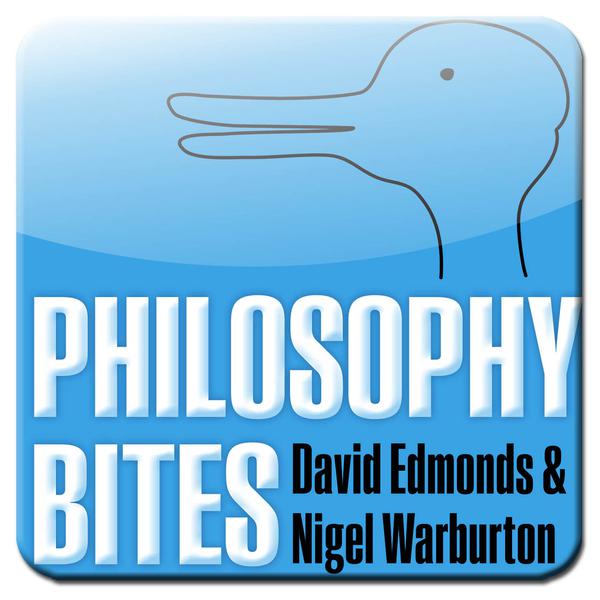
Philosophy Bites
Edmonds and Warburton
- 18 minutesEmily Herring on Henri Bergson
Henri Bergson was once one of the most living famous philosophers. Now he is less well known. Emily Herring, his biographer, discusses this and some of his key ideas in this episode of the Philosophy Bites podcast. Nigel Warburton is the interviewer.
12 March 2025, 4:00 pm - 22 minutes 21 secondsLyndsey Stonebridge on the Life and Mind of Hannah Arendt
For this episode in the Bio Bites strand of the Philosphy Bites podcast Nigel Warburton interviews Lyndsey Stonebridge, author of a recent book about Hannah Arendt, We Are Free To Change the World, about how her thought was affected by her circumstances as an emigré fleeing Nazism.
29 January 2025, 9:02 am - 29 minutes 57 secondsOfra Magidor on Epistemicism and Moral Vagueness
Sometimes, there is vagueness about whether it is morally permissible (or even in some situations required) to perform a certain act—moral vagueness. What is the source of moral vagueness? Ofra Magidor discusses this topic with Nigel Warburton.
This episode of the Philosophy Bites podcast has been made in association with Vagueness & Ethics, a research project funded by the European Commission (grant agreement number 101028625 — H2020-MSCA-IF-2020) and led by Miguel Dos Santos at Uppsala University.
9 January 2025, 4:15 am - 16 minutes 25 secondsRobert Williams on Decision Making Under Indeterminacy
How can we make decisions under conditions of indeterminacy? Robert Williams discusses this challenging issue with Nigel Warburton.
This episode of the Philosophy Bites podcast has been made in association with Vagueness & Ethics, a research project funded by the European Commission (grant agreement number 101028625 — H2020-MSCA-IF-2020) and led by Miguel Dos Santos at Uppsala University.
9 January 2025, 3:38 am - 18 minutesPeter Godfrey Smith on Understanding Minds
Peter Godfrey Smith is famous for his work on understanding the minds of other animals, particularly octopuses. In this episode of the Philosophy Bites podcast he discusses animal minds with Nigel Warburton.
1 January 2025, 7:40 pm - 19 minutes 46 secondsRichard Bourke on Hegel's Philosophy of History
Hegel is a notoriously difficult philosopher to understand. Here Richard Bourke gives a clear route through his key ideas about history and how it unfolds in conversation with Nigel Warburton.
2 December 2024, 11:51 am - 28 minutes 3 secondsJonathan Birch on the Edge of Sentience
Recent zoological research has shown us that a wide range of animals are likely to have sentience. We don't know for sure. There is sufficient evidence to think that it is likely that, for example, lobsters can feel pain. What should we do in the light of this? Jonathan Birch of the LSE, author of The Edge of Sentience, discusses this important question with Nigel Warburton.
21 October 2024, 4:03 pm - 17 minutes 17 secondsCheryl Misak on Frank Ramsey's Life and Thought
The Cambridge philosopher Frank Ramsey died aged 26, but in a short brilliant life he made significant contributions to philosphy and economics. Here in the Bio Bites strand of Philosophy Bites David Edmonds discusses Ramsey's life and thought with his biographer Cheryl Misak.
24 September 2024, 12:37 pm - 14 minutes 50 secondsElizabeth Harman on Moral Heroes
Moral heroes are usually thought of as people who go beyond what is obligatory. Elizabeth Harman discusses whether sometimes we ought to act as moral heroes. She is in conversation with David Edmonds for this episode of the Philosophy Bites podcast.
4 August 2024, 9:25 am - 13 minutes 58 secondsWalter Sinnott Armstrong on AI and Morality
Can AI help us make difficult moral decisions? Walter Sinnott Armstrong explores this idea in conversation with David Edmonds in this episode of the Philosophy Bites podcast.
14 June 2024, 10:23 am - 20 minutes 32 secondsDavid Edmonds on the Life and Philosophy of Derek Parfit
David Edmonds discusses the life and work of Derek Parfit who died in 2017 in this episode of the Bio Bites strand of Philosophy. David is the author of a recent biography of Parfit.
10 April 2024, 5:26 pm - More Episodes? Get the App